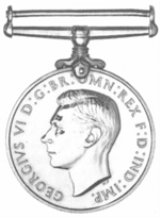
War Medal 1939–1945
Encyclopedia
The War Medal 1939–1945 was a British decoration awarded to those who had served in the Armed Forces or Merchant Navy full-time for at least 28 days between 3 September 1939 and 2 September 1945. In the Merchant Navy, the 28 days must have been served at sea. It is sometimes described as the "Victory Medal" for World War II
, although that is not its correct name.
World War II
World War II, or the Second World War , was a global conflict lasting from 1939 to 1945, involving most of the world's nations—including all of the great powers—eventually forming two opposing military alliances: the Allies and the Axis...
, although that is not its correct name.
Description
- A circular silverSilverSilver is a metallic chemical element with the chemical symbol Ag and atomic number 47. A soft, white, lustrous transition metal, it has the highest electrical conductivity of any element and the highest thermal conductivity of any metal...
(.800 fineMillesimal finenessMillesimal fineness is a system of denoting the purity of platinum, gold and silver alloys by parts per thousand of pure metal by mass in the alloy. For example, an alloy containing 75% gold is denoted as "750". Many European countries use decimal hallmark stamps Millesimal fineness is a system of...
) medal, 36mm in diameter. The British issue medals were made of cupro-nickelCupronickelCupronickel or copper-nickel or "cupernickel" is an alloy of copper that contains nickel and strengthening elements, such as iron and manganese. Cupronickel is highly resistant to corrosion in seawater, because its electrode potential is adjusted to be neutral with regard to seawater...
. - The obverse shows the crowned coinage effigy of King George VIGeorge VI of the United KingdomGeorge VI was King of the United Kingdom and the Dominions of the British Commonwealth from 11 December 1936 until his death...
, facing left, and the legend GEORGIVS VI D:G:BR:OMN:REX ET INDIAE:IMP. - The reverse shows a lion standing on the body of a double-headed dragon. The dragons heads are those of an eagle and a dragon to signify the principal occidentalWestern cultureWestern culture, sometimes equated with Western civilization or European civilization, refers to cultures of European origin and is used very broadly to refer to a heritage of social norms, ethical values, traditional customs, religious beliefs, political systems, and specific artifacts and...
and oriental enemies. At the top, just right of centre are the dates 1939/1945 in two lines. - The ribbon is 1.25 inches wide and consists of 7 coloured stripes: red, dark blue, white, narrow red (centre), white, dark blue, and red, representing the colours of the Union FlagUnion FlagThe Union Flag, also known as the Union Jack, is the flag of the United Kingdom. It retains an official or semi-official status in some Commonwealth Realms; for example, it is known as the Royal Union Flag in Canada. It is also used as an official flag in some of the smaller British overseas...
- The medals were issued unnamed; except those awarded to personnel of the Canadian Merchant Marine, RCMPRoyal Canadian Mounted PoliceThe Royal Canadian Mounted Police , literally ‘Royal Gendarmerie of Canada’; colloquially known as The Mounties, and internally as ‘The Force’) is the national police force of Canada, and one of the most recognized of its kind in the world. It is unique in the world as a national, federal,...
, South African and Australian forces, which were named on the rim. - The medal was designed by Edward Carter PrestonEdward Carter PrestonEdward Carter Preston was an English artist, born in Liverpool. He was a renowned sculptor and medallist. The artist designed the bronze memorial plaques presented to the families of British servicemen and women who died during the First World War...
.
Clasps
- A single bronze oak leaf emblem is worn to signify a Mention in Despatches and a silver oak leaf is worn to signify an award of a King's Commendation for Brave Conduct. There is no bar other than these emblems.

